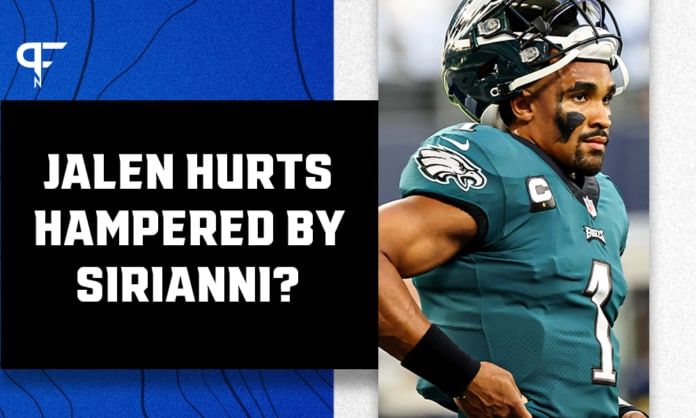When things go wrong for an NFL team, the quarterback and the head coach often face the most scrutiny. It’s no different in Philadelphia, as quarterback Jalen Hurts and head coach Nick Sirianni faced many hard questions on Monday night after a 41-21 drubbing.
Jalen Hurts takes blame for poor play
Hurts took his seat at the table, prepared to face the media after his Philadelphia Eagles endured a lopsided loss to the Dallas Cowboys on Monday Night Football. Through a deluge of questions about execution, turnovers, and the barrage of points the Cowboys put on them, Hurts looked the part of a franchise quarterback and placed the blame on no one but himself.
“I didn’t execute. I didn’t execute. I didn’t do a good enough job of leading. I didn’t do a good enough job of running our offense. This one is on me. This one is one me,” Hurts told the media.
Hurts finished 25/39 for 326 yards, 2 touchdowns, and 2 interceptions, adding 35 rushing yards.
I commend Hurts for his leadership and for not pointing the finger elsewhere — but if he won’t, I will.
Nick Sirianni failed Hurts and the Eagles with his game plan and play-calling
Philadelphia’s first possession started with three wideouts, Miles Sanders in the backfield, and Dallas Goedert at tight end. Their first play from scrimmage was a play-action pass to Goedert for 38 yards, and that was about as good as it went for the Eagles the entire night. Two plays later, Hurts threw a poorly underthrown deep pass that was intercepted near the goal line.
With one of the most mobile quarterbacks in the game, Sirianni didn’t call an RPO until 49 seconds left in the first quarter. It was stuffed for a loss. Philadelphia’s offense was stagnant and boring. A handoff was not called to a running back until 7:10 left in the second quarter. And guess what? Sanders ripped it for a 24-yard gain.
Inexplicably and inexcusably, he saw 1 carry for the rest of the game. Fellow running back Kenneth Gainwell? He also handled just a single handoff.
The Eagles rushed the ball three times. Three. Total. For the entire game.
“The first half, with not running that many plays, those numbers get skewed sometimes,” Sirianni said after the game when asked about Sanders’ lack of touches. Sirianni also mentioned that being down two scores in the second half was a factor in the lack of opportunities given to Sanders.
Completely — and I mean completely — abandoning the run because of a 2-touchdown deficit after only one quarter is not only grossly irresponsible but indicative of a panicked head coach and play-caller.
It’s hard to blame the game script for a lack of rushing attempts when the running game was non-existent, even at the start of the contest.
Philadelphia should take notes from Dallas
The Cowboys, on the other hand, varied their approach. Dak Prescott lined up under center and in shotgun. Dallas ran and threw from every formation. Sometimes they were in three-wide sets, sometimes four-wide, sometimes they had both running backs on the field, sometimes they went heavy tight end. They kept Philadelphia’s defense guessing for the entire game.
Dallas has an offense that can expose and dismantle opposing defenses in a variety of ways. The Cowboys have two running backs that can hurt you. They can line up in a power formation. They can attack the seams with their tight ends. They can punish you through the air — they can hurt you in a number of ways because the opposing defense has to account for it all.
When you line up in the same formation and run an unimaginative, stagnant offense from the first snap onward, you are setting your team up for failure.
Yes, personnel matters, and Dallas has better skill position players than Philadelphia — but you at least have to try. Design an offense that plays to the strengths of your quarterback and can put defenses in a bind. DeVonta Smith, Jalen Reagor, Sanders, Gainwell, Goedert, and Zach Ertz are not a bad cast of characters.
Hurts can still be an NFL quarterback
The overreaction this morning — including discussion of which quarterback the Eagles should draft in the first round of next year’s draft — is egregious. Hurts has started only seven games at quarterback in the NFL, and he’s growing by leaps and bounds.
Last year, Hurts had a completion rate of just 52%. This year, it’s at 66%. His yards per attempt, quarterback rating, and touchdown percentage are all up from last year. He also has more rushing yards so far this season than Alvin Kamara.
Need I go on? Hurts has the tools to be Philadelphia’s long-term quarterback, but Sirianni needs to do a better job tailoring the Eagles’ offense to his skill set. Use those three first-round picks next year to add three potentially game-changing talents to a roster with plenty of holes.

